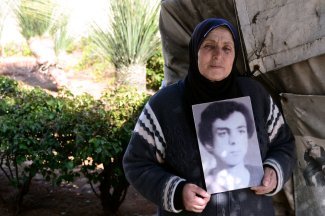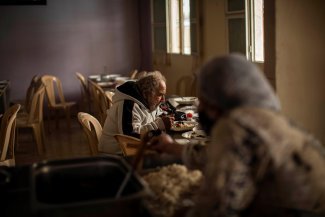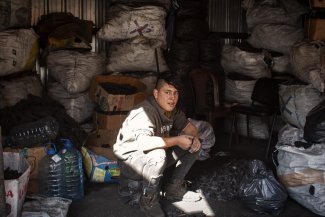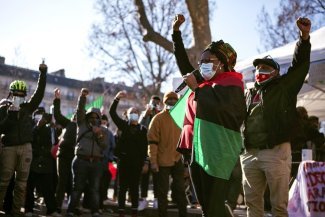Tonny Azzi, a municipal police officer, organises his hairdressing case at his home in Dbayeh, southern Lebanon.
Twenty-two years ago, Tonny Azzi switched his hairdressing case for a badge and a gun. Being a civil servant was going to give him financial stability, social security and a pension. Now, this municipal policeman from Dbayeh, near the Chouf Mountains, is once again cutting hair at home to help pay his bills.
“My wife also works, she is a teacher, but what we get from our salaries is not enough to cover the family’s minimum outgoings,” he says. His civil servant’s salary is 2,000,000 Lebanese pounds, which amounted to around US$1,400 (€1,210) before the financial crisis but, at the current exchange rate, is no more than US$130 (€126).
This type of hardship has become commonplace among civil servants, which is why they are having to do side jobs to be able to survive in the Lebanon of today.
The municipality of Dbayeh is the third largest in Lebanon, with some 20,000 inhabitants, but the only permanent staff in charge of security are Azzi and his partner Nassir – both of whom are of retirement age. The ten or so other local officers are all on temporary contracts.
“Only the two of us conduct the checks that we have to report on to the municipality: all the illegal constructions, the housing that isn’t registered but inhabited and the illegal connections to water and electricity supplies in the whole area. We are overburdened with work and what I’m paid goes straight to the electricity company,” complains Azzi.
The workload is also excessive at the Dbayeh municipal council, which is responsible for the surrounding villages as well as the city itself. Government cuts to take the strain off the empty public coffers combined with a regulation, in force since 2019, prohibiting the recruitment of new civil servants in Lebanon, have left local administrations seriously short of staff. Dolly Boustany, the longest-serving civil servant in the Dbayeh municipality, not only has to do her own job but also the administrative tasks – because the secretary retired two years ago – as well as serving as deputy mayor when the latter is absent.
With the fall in the value of the currency and the rate of inflation, municipal employees often find themselves having to weigh up whether it is worth going to work, as there are times when their fuel costs exceed the salary they receive at the end of the month.
“We have been asking for a rise in our transport allowance. They give us an extra 25,000 Lebanese pounds a week for transport,” which is the equivalent of US$1.50 (€1.60) – and the currency continues to be in free fall, explains the municipal official. As a result, absenteeism among public sector employees is now an open secret. As a police officer says, on condition of anonymity: “They only come to the police station or the academy once or twice a week.”
He continues: “The senior officers tend to turn a blind eye when it comes to the lower ranking officers, because it isn’t right to make them come to work when they’re having to earn money on the side to make ends meet,” says the policeman. “They have turned us into vegetarians by force,” he jokes, trying to make light of a desperate situation, but the fact is that with inflation running at nearly 200 per cent, buying meat is prohibitively expensive these days.
“With the conditions we have, who can accuse the public administration of being totally corrupt?” asks a resigned Boustany, alluding to another of the ills rooted in the crisis.
Ideas to build unity and prevent collapse
Fears of a collapse of the police force and of officers abandoning it have led the military authority to “withhold passports” from members of the security forces to prevent them from fleeing the country, says a European diplomat, who does not want to be identified.
“Because of the financial collapse, there is no state. When an institution doesn’t care or doesn’t assume its responsibilities, parallel administrations emerge. This is what is happening in the municipalities, there is no relationship between the Ministry of the Interior and the municipalities,” explains Thomas Valetas, a member of the European ‘community policing’ project team. The project is funded by the European Union with a budget of €15 million over a five-year period, which began in 2021, and is managed by the Spanish and French agencies FIIAPP and CIVIPOL.
One of the challenges of the programme, says Valetas – who oversees local police training courses at the Internal Security Forces (ISF) Academy – is to “unify the local police force in terms of tasks and responsibilities”, and put an end to a modern-day taifa system of sorts, where everyone does what they want because it is their domain.
According to Valetas, members of the local police are chosen for their loyalty to the mayor and, unfortunately, most of them have no relevant qualifications or training whatsoever.
Years of clientelism and corruption in public administration have fostered mistrust between citizens and the security forces, making it difficult to change people’s perceptions.
“As public employees, police officers are there to serve citizens,” Valetas insists. “Our aim is to centralise the security forces and to foster cooperation between national and municipal officers and civil society, but they are reluctant to change their approach to each other.”
“To ensure the sustainability of this project – once we have completed the training – we need to ensure that the municipal police can continue to receive the same training as we have given them, through local trainers,” he concludes.
Private security initiatives: serving all citizens or specific minorities?
The vulnerability of the security forces is a ticking time bomb for Lebanon, a country in turmoil, where unrest and crime are growing in parallel with the economic and financial crisis. According to data published by the Beirut-based firm International Information, theft-related offences have increased by 266 per cent since the onset of the economic crisis.
People neither feel safe nor protected in their neighbourhoods. As a result, local residents are looking to manage their own protection through family clans or political parties. Some parties have assumed the role of private security providers in certain areas, in exchange for political support or money.
While these informal security arrangements are most often identified with the Hezbollah militia-party and its partner Amal, in Shiite areas, Christian politicians such as MP Nadim Gemayel of the Lebanese Phalange have also started to train and fund their own ‘vigilantes’ in the Christian neighbourhood of Achrafieh in central Beirut. The desolate atmosphere due to the lack of street lighting in central Beirut prompted the leader of the Phalange party to hire a private security company to train 200 volunteers, who patrol the streets with torch and baton in hand, to combat the rise in crime. “It is a basic right for our neighbours, for our children, to feel safe when they go out or return home. We are here to protect our families,” exclaims Akram Nehme, the manager of the initiative.
For some residents of Achrafieh, like Mariam, these “guardian angels” have brought reassurance to the families in the neighbourhood. “I used to close the shop at 19.30 in the evening. I close earlier now, as the customers have stopped coming because there is no light on the street. It’s deserted and it’s really frightening. But I feel a bit safer since the security guards have been here,” says Mariam, who runs a shop in the neighbourhood.
While there is praise for the initiative in this Christian neighbourhood, others criticise it, comparing it to the days of the Lebanese civil war (1975-1990), when militias patrolled the streets of their respective neighbourhoods.
In a country like Lebanon where (invisible) sectarian barriers divide the population, the fact that a group of night-time vigilantes are taking on the task of security has raised alarm bells. “This is a delicate time in the country. There is no president and no government. Everyone is calling for Hezbollah to be dismantled and disarmed. We cannot allow another group to take over the security of their region now,” warns Michel de Chadarevian, former diplomatic relations officer to Lebanon’s former president Michel Aoun.
But Gemayel rejects the assertions that his initiative shares similarities with the patrols organised by militias during Lebanon’s sectarian conflict. “We are not in a civil war. We are not in a war situation. We are not seeking to replace the security forces; we are fully coordinated with the police, the intelligence services and other relevant authorities,” insists the leader of the Christian Phalange party of Lebanon.
Yet it is difficult not to think of the past when, for many in Lebanon, the name Gemayel is synonymous with the civil war. Bashir Gemayel, Nadim’s father, was the first Christian president to be killed during the fratricidal war of the 1980s. He was also the founder of the Lebanese Forces, the most bloodthirsty Christian militia responsible for the deaths of thousands of Muslim and Palestinian refugees in the Sabra and Shatila camps.













